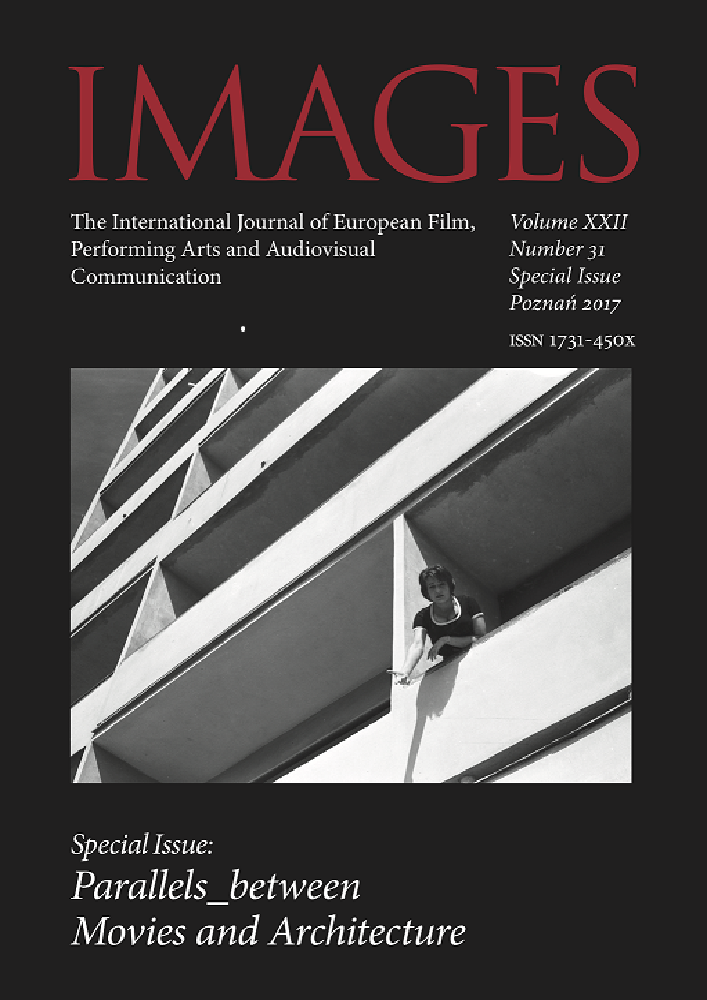Abstract
The materials used by architectural historians to research the post-war period are very limited, and the available archive resources are incomplete and dispersed. In this context, of special significance are other forms of visual materials that documented the spatial reality of the communist period. Documentary films, and in particular the Polska Kronika Filmowa [Polish Film Chronicle] newsreel, can make an an important contribution to and a resource for historical research on contemporary Polish architecture. This text contains methodological reflections on the role of film studying the history of contemporary architecture. It describes the new research options, including the ability to recreate original spatial phenomena, and also the contemporary techniques and technology as well as the educational dimension of the Polish Film Chronicle. In this context, it is especially interesting to compare the documentary material from the Chronicle with other archival material, e.g. drawings, plans and photographs. This method provides an additional opportunity for a fuller and more objective recreation of space in 3D. This “reverse modelling” can be used to restore or preserve the original condition of structures, or even to rebuild ones no longer existing.
References
Bocheńska J., Film dokumentalny, Polski film krótkometrażowy w 25-leciu PRL, Warszawa 1969
Budownictwo i architektura w Polsce 1945–1966, ed. J. Zachwatowicz, Warszawa 1968
Cieśliński M., Piękniej niż w życiu: Polska Kronika Filmowa 1944–1994, Warszawa 2006
Fantoni Minnella M., Habemus Nanni: lessico morettiano: architettura di un autore, Parma 2015, pp. 1–95
Ferro M., Kino i historia, Warszawa 2011
Ferro M., Le film. Une contre-analyse de la société?, in: Faire de l’histoire, eds. J. Le Goff, P. Nora, Vol. 3, Paris 1974; Polish translation: M. Ferro, Film. Kontranaliza społeczeństwa? in: Film i historia. Antologia, ed. I. Kurz, Warszawa 2008, pp. 67–92
Hendrykowski M., Film jako źródło historyczne, Poznań 2000
Karczowa H., Reportaż filmowy i kronika jako źródło historyczne, “Studia Źródłoznawcze” 1971, no. 16
Kotarbiński A., Rozwój urbanistyki i architektury polskiej w latach 1944–1964, Warszawa 1967
Kowalski J., Meble Kowalskich. Ludzie i rzeczy, Dębogóra 2014
Leszczyński D., Zdrowy rozsądek i sceptycyzm, “Roczniki Filozoficzne” 2011, pp. 5–34
Marciniak P., Reading and Writing Architecture. Polish Architectural Magazines (1945–1989), in: Printed in Red. Architectural Writings during Communism, “Studies in History and Theory of Architecture” 2013, no. 1, pp. 21–29
Matuszewski B., Une nouvelle source d’histoire – Nowe źródło historii, Warszawa 1955
Orliński W., Metropolis zmienia kino i świat, “Gazeta Wyborcza” 2008, 4 April Przylipiak M., Poetyka filmu dokumentalnego, Gdańsk 2000
Szafer T.P., Nowa architektura polska. Diariusz lat 1966–1970, Warszawa 1972
Szafer T.P., Nowa architektura polska. Diariusz lat 1971–1975, Warszawa 1979
Szafer T.P., Nowa architektura polska. Diariusz lat 1976–1980, Warszawa 1981
Topolski J., Metodologia historii, Warszawa 1973
Topolski J., Teoria wiedzy historycznej, Poznań 1983
Żurawicz A. Kinematografia w Polsce, “Wiadomości Statystyczne” 2010, No. 7, pp. 23–36.
